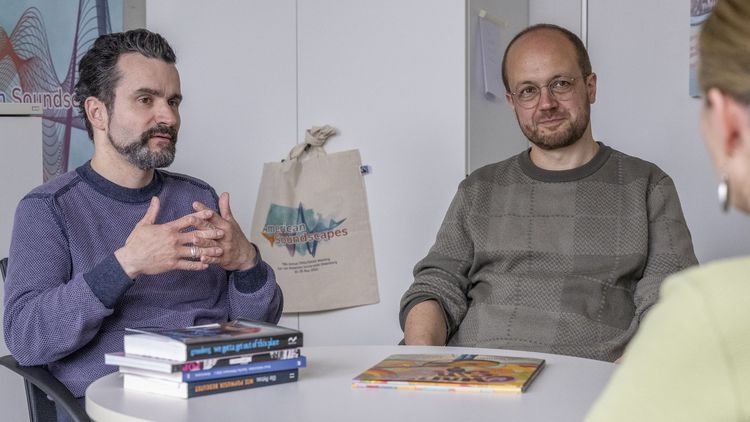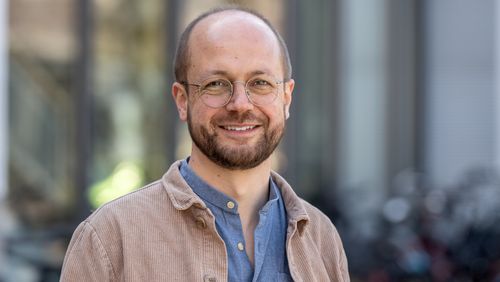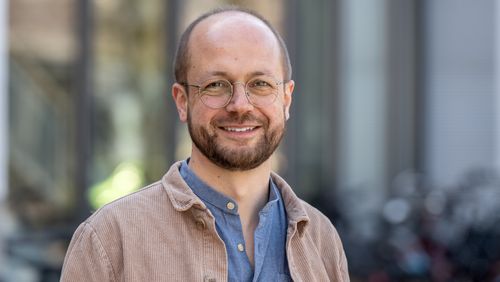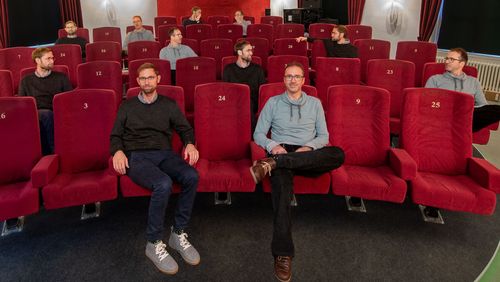What does the US sound like? This intriguing question and its many facets will soon be the subject of a conference at the university. Martin Butler, Professor of American Studies, and musicologist Mario Dunkel share their observations from both an academic and personal perspective.
The two of you, along with a team from the Institute of English & American Studies and the Institute of Music, are hosting the upcoming “American Soundscapes” conference. So what does the US sound like?
Butler: If I could answer with a wish, the United States would sound as diverse as this country once promised itself it would be. But when I listen to it now it just sounds like a political election campaign. And then we hear the rhetoric and polemics of presidential candidate Donald Trump, because they’re pretty loud – there’s plenty of noise coming from that direction. And something that is immediately noticeable is that certain things we should be hearing, such as a fact-based discourse, are barely audible at the moment. The US sounds very agitated right now.
Dunkel: A more nuanced answer to that question from two cultural studies scholars might end up going beyond the scope of this interview (he grins)...
Please feel free to pick out something yourself!
Dunkel: Well firstly, there’s the fact that even here we are constantly surrounded by the sounds of the US: contemporary popular music would be inconceivable without the influence of US musical history. We get an idea of this just by listening to ragtime music from the end of the 19th century – and paying attention to how many ragtime elements are still present in popular music. Or the history of jazz, then rhythm & blues, which became rock n’ roll, and then rock, and so on... The popular music of the US is deeply engraved in our popular culture, so it's hard to say: this is what the US sounds like and this is what Europe sounds like.
Jazz has often served to represent the US
So from a musicological point of view the sound is the same everywhere, so to speak? Or is there something that is characteristic for the acoustic side of the US – perhaps for you personally?
Dunkel: For me personally, the US is very closely associated with jazz acoustically. For one thing jazz is a product of African-American music history. For another, it’s tightly interwoven with US foreign policy. Since the 1950s, jazz has often served to represent the US, for example during the Cold War when the US State Department sent jazz bands around the world as cultural ambassadors to open doors in various countries. A similar process is still happening today: we’ll have an expert on the State Department’s current hip-hop programmes on stage at the conference, for example. I myself do research on jazz and diplomacy, and I also play jazz piano. So the sound of this kind of music means a lot to me and is an important facet of the US for me personally.
Butler: For me, it's mainly the sounds of urban environments, especially New York City – I have a special connection with that city. I associate Manhattan with a certain type of siren wail and the soundscape of a totally overcrowded Times Square, for example. I could go into more detail, but of course that's not the US, but only a very small section of it. It's a place where I have friends, so I can make associations of a very personal nature; I might recognise a certain sound, for instance the New York accent, and classify it as meaningful to me.
So it depends on how we as individuals assign meaning to certain sounds.
Butler: Exactly. I recently held a seminar in which we tried out different listening practices, each aimed at finding out where a sound comes from, what it means and what effects or emotions it produces. For example, I played the sound of an air conditioning unit of the type you see on the outside of many apartment buildings in big US cities, and it's really interesting to see how listeners categorise it without context. Sometimes the vocabulary to describe it without including cause, effect and meaning was simply lacking. We ended up using colours: “this sounds green” or “that sounds white”.
The subject of your conference is very multifaceted. What can be discussed and analysed when it comes to sound?
Butler: Among other things, we want to look at where sound comes from, who produces it under what circumstances, where and when. It’s also about how noises, sound, music and voices disseminate. Another aspect that interests us is who is able to make noise, or at least make themselves heard – and who isn’t? And why? What technologies are involved, what role do social media play? How do they create resonance spaces and bubbles that amplify certain voices and sounds? We will also ask how sounds are actually perceived and take on meaning. And then we’ll look at how sound always interacts with other sign systems – with visuals in film, for example – to create a synaesthetic impression.
Dunkel: Last but not least, it's about the musicological perspective, for instance the question of what defines music? The term ‘music’ is evaluative, it assigns a certain value to the sound or different sounds that are designated by the term. In the history of music we find types of music that were once denied this recognition. An example of this is certain African-American musical practices which were often referred to as ‘noise’ in the 19th century and not even recognised as music. Here too, a certain value was ascribed to sounds – but in the sense of a devaluation. These are things that interest us. Contrary to this restrictiveness, we deliberately didn’t limit the topic of the conference to music, but are also interested in soundscapes in general.
The US media system and its channels work differently than those in some European countries
One panel topic on the conference programme caught my eye in particular: Pop, Politics, Populism – the Sound of the Election. What does an election campaign sound like? And does the US election campaign have its own unique sound?
Butler: That’s something we want to discuss. The US media system and its channels work differently than those in some European countries, for example. Right now, they are producing a lot of bluster, for example at rallies or during debates between the candidates. The goal is to combine this with the visuals and create a huge stage for those who are running for office. The question then, for example, is whose voice will prevail. Trump’s voice, for example, has already become so omnipresent, not least because it is constantly parodied. But it could also be certain slogans that are constantly repeated, like a mantra, and thus come to define the election campaign. So there is a special tonal and vocal dimension to the election campaign which we want to discuss: what does it sound like, and what power does sound wield in it?
Dunkel: To go back to the subject of the voice: the political discourse we are currently hearing often focuses on what we associate with a voice in terms of the age of the speaker. In his podcast a few months ago, New York Times columnist Ezra Klein compared the current sound of US President Joe Biden’s voice with recordings of his voice during the last election campaign four years ago. He thought he could demonstrate how much Biden had aged based on these recordings, and then went on to argue that the Democrats should nominate a different presidential candidate. However, this was before Biden's powerful State of the Union address, after which he was perceived differently. This is an example of how people attribute certain characteristics to a person based on the sound of their voice. Such attributions can in turn become politically powerful. This is another aspect we want to discuss.
And the panel keyword ‘pop’ is clearly about music...
Dunkel: Music has played a major role at various points in the election campaign. Take the song ‘Rich Men North of Richmond’ by Oliver Anthony, which was released shortly before the first Republican primaries. It was played at the start of a TV debate, and the candidates were asked to comment on the implied criticism that the rich and influential politicians in the US capital Washington – located north of Richmond – are an aloof elite that ignores the worries and plight of the hard-working people in the country. This demonstrates how a specific song can suddenly become relevant in the political discourse. And it’s an example of a song that becomes embedded in a populist gesture of ‘us against them up there’, but at the same time it can’t be directly attributed to any specific party. Anthony subsequently distanced himself from attempts by Republican politicians to appropriate the song.
Butler: There was also the debate about whether Trump should pick a fight with Taylor Swift... so about the question who supports whom, and who reinforces whose messages, or not? These are celebrities from, for example, the pop music scene, who can also make their voices heard. All these facets can be examined – and of course the same goes for the question of how algorithms in social media apps promote and amplify certain voices and sounds, for example.
One last question: what will the conference itself sound like?
Butler: Hopefully the sound of it will reach beyond the lecture hall and the academic world – so that people out there hear about it too. I would like the conference to be audible in the city as well, for example.
Dunkel: It could also sound a bit off-key, because we're organising a karaoke evening for the participants as a fringe event (they both laugh).
Interview: Deike Stolz




